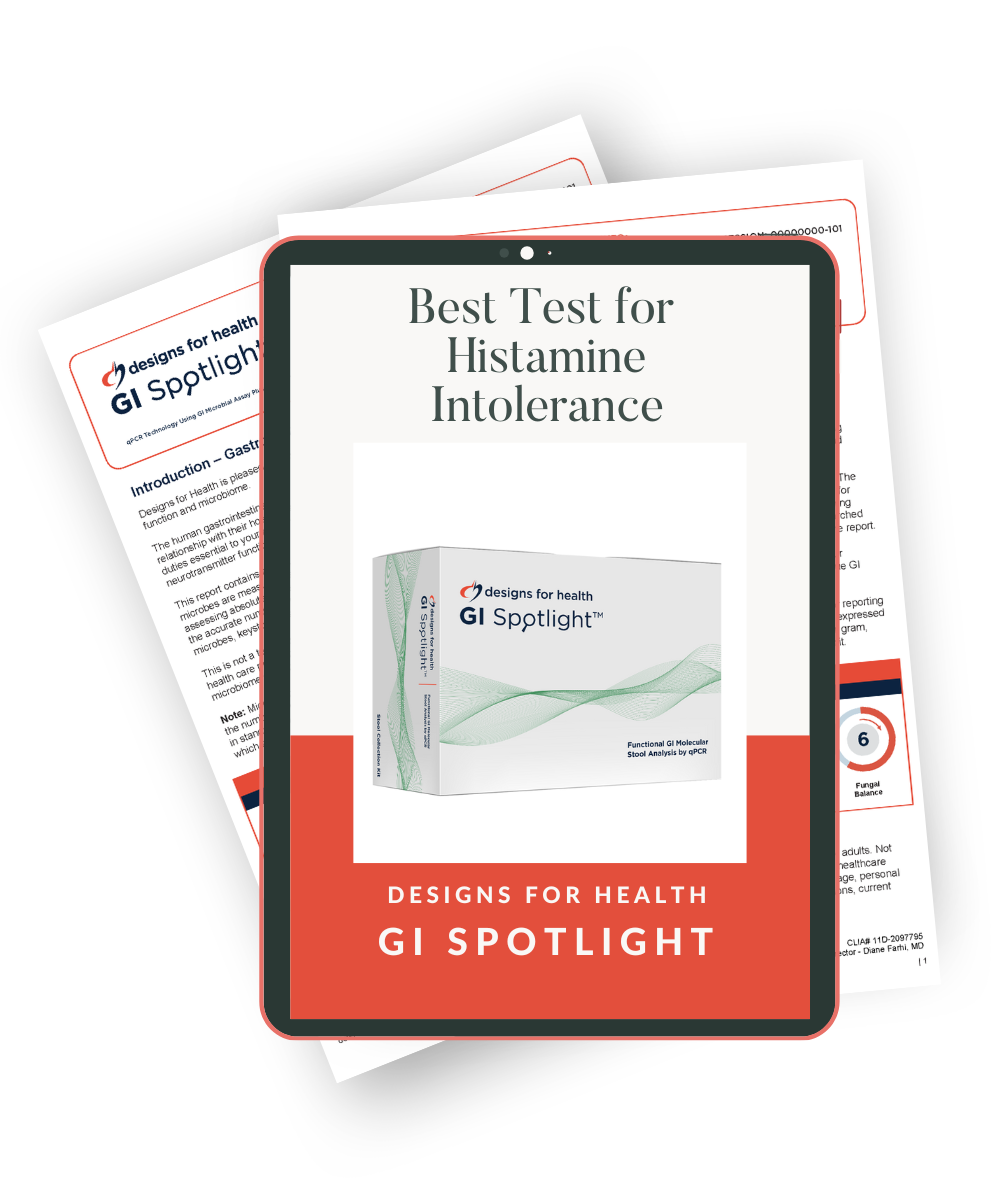Can You Test For Histamine Intolerance ?
Are you giving up your favorite foods because you believe you are histamine intolerant to help relieve your symptoms?
Then you are probably looking for a test to determine if you are histamine intolerant and what might be the cause of your food intolerances.
After all, who wants to give up wine, cheese, yogurt, and avocados forever?
Determining if you are histamine intolerant can be frustrating as there is a lack of understanding and even recognition by most healthcare practitioners.
One of the causes of the lack of recognition of
Most of the tests for
But could there be integrative tests not used in conventional medicine that could help you determine if you are histamine intolerant? And what might be the underlying cause of your
What is Histamine Intolerance ?
Histamine is a chemical that our bodies releases and is used for many different purposes, including playing a major role in our immune system – think allergies.
Because it is technically a toxic compound, histamine needs to be degraded or broken down to prevent symptoms like digestive disturbances, insomnia, migraines, and allergic symptoms.
Most of the food we eat also contains histamine as a natural chemical that, in most cases, is produced by bacteria coming into contact with the food and converting histidine (protein building block) to histamine.
For instance, histamine levels increase with fermented foods as a reaction between the bacteria and histidine. Fish is exceptionally high in histidine, so fish that has been left out at room temperature for an extended period of time before cooking or eaten as a leftover will be very high in histamine.
Like other food intolerances, enzymes are used to break down chemicals and compounds in the food. For instance, lactase is the enzyme that breakdowns lactose (milk sugar), and a lack of lactase will lead to lactose intolerance.
Histamine that our bodies release and the histamine found in food are broken by two main enzymes: diamine oxidase (DAO) and histamine-N-methyltransferase (HNMT).
Histamine intolerance develops when histamine levels increases or our histamine “bucket” is full due to a lack of these enzymes that degrade histamine.
Why are Symptoms so Varied with Histamine Intolerance ?
Histamine is synthesized and stored in many different parts of our body to help perform many functions.
One function is to support a healthy immune response to foreign invaders. When we develop allergies, we release high amounts of histamine hence the use of antihistamines to help control excessive histamine.
In addition, to being stored in our immune system, histamine is stored in gastric cells known as enterochromaffin cells, lymph nodes, and the thymus allowing histamine to be used for many functions, including stimulating gastric acid (stomach acid), healthy inflammatory response, and helping to manage blood pressure.
Because histamine is also produced as a neurotransmitter (brain signaling chemical), high histamine levels can impact our mental health and ability to sleep soundly throughout the night.
So, you can see how high histamine levels can lead to many symptoms, including digestive disturbances, insomnia, and more.
- Migraines, Headaches
- Insomnia
- Brain Fog
- Nausea
- IBS – Both Constipation & Diarrhea
- Anxiety
- PMS – Estrogen Imbalances
- Thyroid Dysfunction
- Nerve & Muscle Pain
- Allergic Symptoms
- Autoimmune Flares – Hashimoto's, Psoriasis
What Are Causes of Histamine Intolerance ?
We have been eating foods high in histamine for centuries as we use fermentation, drying, and smoking as a method to preserve our food. These preservations methods create high levels of histamine in our food like smoked fish, dried beef, or sauerkraut.
Why are people suddenly struggling with eating foods high in histamine like fermented vegetables, yogurt, and preserved meats? One of the reasons is that
And we did not understand how histamine is degraded until recently with the continued research on gut health, the microbiome, and the genetics of
Determining the cause of
More and more research is showing that
Having intestinal permeability or leaky gut is now considered one of the leading causes of
Are there other causes of
- Autoimmune Conditions, i.e., Crohn's, Ulcerative Colitis, or IBD
- Other Food Sensitivities & Intolerances (i.e., Gluten, Tyramine, Sulfur)
- Hidden Infections, i.e., Candida Overgrowth
- Hormones – Estrogen Dominance
- Chronic Stress
- Genetics
- Nutrient Imbalances
- Allergies
What are Some of the Tests for Histamine Intolerance ?
Right now, the “gold standard test” for
In addition to completing a journal and consuming a low histamine diet, try supplementing with DAO Enzyme like HistaHarmony by Healthy Gut. If these supplementing with DAO helps, then you most likely have a reduced DAO enzyme.
Doing a food/symptom journal will help you to identify if you are histamine intolerant and hopefully give you some relief from your symptoms. After all, it was how I discovered I was histamine intolerant and finally got some relief from my IBS, anxiety, psoriasis flare-ups, PMS, and migraines.
However, a food journal and supplements won't get down to the cause of your
Let's look at some of the tests for
- DAO Enzyme – Serum (Blood)
- Histamine – Serum (Blood)
- Tryptase
- Food Intolerances – Gluten
- Leaky Gut or Intestinal Permeability
- Neurotransmitters – Histamine, Glutamate (Urine)
- Genetics
Is Testing for Histamine and DAO Very Accurate for Histamine Intolerance ?
Current research shows that testing for the DAO enzyme levels can be a reasonably accurate way to determine
In one study, patients who struggled with
Testing for serum (blood) histamine and tryptase alone have not been shown to be an accurate method for testing for
To test positive for
Tryptase, which is often used to diagnose mast cell activation syndrome (MCAS), samples would need to be taken throughout the day or during what they refer to as an “event” to be accurate.
However, testing for serum DAO and histamine can be a reliable test for

GI Spotlight Microbiome Testing Package
Tired of guessing what’s causing the bloat, brain fog, or skin flares? Learn if histamine intolerance is to blame and start your healing journey with a plan made just for you.
What is the Best Test for Histamine Intolerance ?
Struggling with histamine issues, leaky gut, or gluten sensitivity? This test could be your next step.
The GI Spotlight Microbiome Test by Designs for Health goes beyond your average gut test. It looks deep into your microbiome, measuring the balance of good and bad bacteria, digestive enzymes, and even the presence of histamine-producing microbes—something that can play a big role in symptoms like bloating, headaches, and skin issues.
What makes this test special? It checks markers linked to leaky gut and food sensitivities, including a gluten reactivity marker (anti-gliadin sIgA) and zonulin, a key protein connected to gut barrier health. It even identifies whether your body might be lacking enzymes like DAO, which help you break down histamine from foods.
You’ll also get insight into short-chain fatty acid levels—compounds your gut makes to calm inflammation and support histamine tolerance. If you’ve been wondering whether gluten is to blame for your symptoms or if your microbiome is simply out of balance, this test can help provide clarity.
Each test includes a personalized nutrition and supplement plan based on your results. It’s not just data—it’s a blueprint for healing.
Are you ready to get answers and feel better? Let’s start your gut-healing journey—book your Discovery Chat today.
Book Discovery Chat Today
Learn more about how I can help you to resolve







